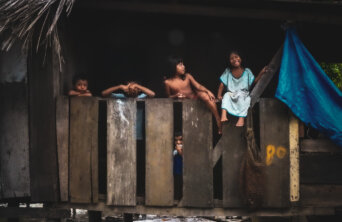- About
- Topics
- Story
- In-Depth
- Picks
- Opinion
- News
- Donate
- Signup for our newsletterOur Editors' Best Picks.Send
Read, Debate: Engage.
| topic: | Health and Sanitation |
|---|---|
| located: | Panama |
| editor: | Nour Ghantous |
Healthcare on Isla Tigre, a small island in Panama’s Bocas del Toro archipelago, is as elusive as it is essential. Home to 750 residents, primarily from the Ngäbe-Buglé Indigenous community, the island has a health centre—but it stands empty most of the time. Medical professionals only visit once every three months, leaving residents vulnerable to chronic illnesses, waterborne diseases, and malnutrition.
For Uva, a mother from Isla Tigre, this lack of access had devastating consequences. “My daughter had a diagnosis of leukemia, and it was very difficult to get help. We had no health centre and no one on the island qualified to say what was wrong,” she explained to FairPlanet in our latest documentary. Her story is not unique. Many residents share similar struggles in a region where healthcare is a distant hope, not a guarantee.
On this trip, the Floating Doctors, a global volunteer-led organisation based in Panama, attended to around 80 patients, providing medical, prenatal, and dental care.
While the organisation focuses on providing immediate medical assistance, education is at the heart of its mission. “We provide a huge educational programme to help people understand what is going on in their bodies,” explained Victoria Corvera Pose, Floating Doctors’ operational manager, to FairPlanet. During this visit, the team hosted a hand-washing workshop for schoolchildren, using resources from Recycle Soap. These workshops aim to instillinstil lifelong hygiene practices. “It’s very important for children to learn how, when, and why they need to wash their hands,” Pose added, emphasising that prevention is key to combating common illnesses in the region.
Healthcare challenges on Isla Tigre are compounded by a lack of clean water and proper nutrition. Many families rely on rainwater tanks or wells, treating the water with chlorine to prevent illness. But these measures aren’t always enough. “Waterborne diseases like diarrhea and parasitic infections are rampant,” says Hayley ReyCraft, Pharmacy Manager at Floating Doctors. Chronic malnutrition also takes a toll, particularly on children. “You see a lot of stunting because they don’t have access to the food they need to grow properly,” ReyCraft notes. Uva underscores the urgency: “If you don’t have water, how are you going to live? If you don’t have health, how are you going to live?”
The work of Floating Doctors is essential, but it also underscores the need for systemic change. While Panama’s Indigenous communities benefit greatly from such interventions, they cannot replace the role of a functioning healthcare system. Isla Tigre remains underserved and largely forgotten, with the Floating Doctors only able to visit these communities once every three months, which means urgent care is extremely difficult – if not impossible – for residents.
The Panamanian government must invest in long-term solutions – establishing permanent health services, improving water access, and addressing malnutrition. Until then, Floating Doctors remains a lifeline, offering both hope and help to Panama’s most vulnerable communities.
The Floating Doctors in Panama is the latest episode of FairPlanet’s On The Ground series, now streaming on Instagram.
Image by Nour Ghantous.
